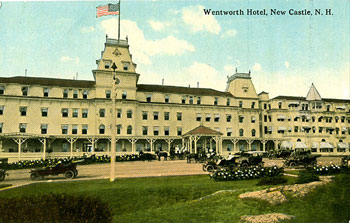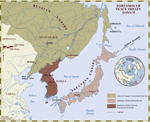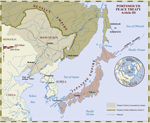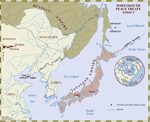
Negotiations, Part 3:
August 13, Sunday: Walk in the Rose Garden
On Sunday, members of both delegations attended church. Witte, Rosen, and other members of the Russian suite went to Christ Church in Portsmouth.
Naval officer George H. Rock escorted the men to their seats and, while no sermon was delivered in keeping with Russian custom, the choir sang the Russian national anthem. After the services they went out of the church to be "photographed by a half dozen Kodakers." Witte and Rosen went for an automobile ride in the afternoon.
On Sunday evening Ambassador Takahira and Mineichiro Adachi made a surprise visit to the Second Congregational Church of Kittery, attending both Christian Endeavor and the praise service. The men joined in the hymn singing and Takahira caused a stir when he put $5 in the collection plate. From this day until September 5, when the peace conference ended, both delegations were seen throughout the region at various social events and receptions.
That Sunday, August 13, Portsmouth treaty historian Thomas C. Wilson believed Witte and Komura, both of whom spoke French, met secretly and alone in the rose garden at the Wentworth, and convinced each other of their desire for peace and economic and political security in the Far East.
Despite the disagreements expressed between Witte and Komura during the formal sessions, it is believed that the commitment to peace expressed to each other during the rose garden walk ultimately kept the delegates negotiating long enough for their governments to agree to peace.
August 14, Monday: Demands I and II Approved
On Monday before the discussions began, Secretary Peirce escorted photographers into the building and the delegates were photographed in the conference room. In the morning session they agreed to Demand I (Korea) and made it Article II in the Treaty. They agreed to combine Demands II and III into Treaty Article III concerning both parties' evacuation of Manchuria. In the afternoon Komura's draft proposal for Treaty Article III was approved.
On Monday evening, August 14, Witte met with New York financier Jacob Schiff and other Jewish bankers to discuss Russia's treatment of the Jews and Russia's discriminating laws against the Jews. Witte expressed sympathy with their cause; he indicated that he personally had treated Jews well and said it was beyond his power to make any changes in the various restrictive laws. But, when Witte suggested that, given the politics and culture of Russia, the Jews might be better off with the restrictive laws that treated Jews unequally politically and socially, he drew a sharp rebuke from Schiff.
The most powerful Jewish American banker, Schiff had been horrified by the pogroms of Jews in parts of Russia prior to the war and, as a result, agreed to finance Japanese bank loans in the United States and blocked all efforts by Russia to obtain loans in the Untied States. He continued to aid the Japanese in obtaining further loans in England and later other parts of Europe.

One of several views of envoys posing in the conference room of the General Stores Building. Portsmouth Athenaeum collection. View larger image.
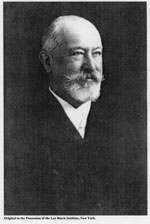
Jacob Schiff and other Jewish bankers met with Witte to discuss Russia's treatment of the Jews.
August 15, Tuesday: Demands IV (Manchura open door) and VI (Port Arthur Lease) Approved, Demand V (Sakhalin) Deferred
In the morning of the fourth formal session, Witte and Komura agreed on the open door policy in Manchuria (Demand IV, Treaty Article IV) and later launched into a long irreconcilable debate over Sakhalin. The delegates agreed to discuss the problem later rather than halt the negotiation process over this issue. The question of the payment of an indemnity became a major issue for both Russia and Japan. Each country had been concerned about the matter long before arriving in Portsmouth. Russia's position, the Tsar ordered Witte to support, was not to pay indemnity, nor to give up any Russian territory. Witte was adamant in statements to United States Ambassador to France Robert McCormick that if the Japanese pursued their request for a large payment, the negotiations would be brief and end in failure, Witte said Russia was prepared to fight on, but he appealed to France and England for financial and political support. France agreed to make additional loans, but only for payment of an indemnity, not for a continuation of the war. England, who had a treaty with Japan, declined to ask the Japanese to make any moderation in its demands. On August 12, the Anglo-Japanese Alliance was renewed.
According to Komura's instructions from his government, the return of Sakhalin and the indemnity were considered secondary matters, but Komura considered them indispensable. He was adamant that Russia, who had provoked the war, would have to pay for its actions, even though at the meeting with Roosevelt at Sagamore Hill, he learned of Russia's opposition to any payment. Komura also knew that the Japanese people considered the war to be a Japanese victory and expected not only the indemnity, but also the retention of Sakhalin, which had been Japanese long before Russia came into the Far East.
Demand VI, concerning the transfer of the leases on the Liaotung peninsula including Port Arthur to the Japanese was discussed and approved in the afternoon session, and became Article V of the Treaty.
August 16, Wednesday: Demands VII and VIII -- Railways
In morning and afternoon sessions, Witte and Komura discussed and approved the transfer of the South Manchurian Railway to Japan (Treaty Article III and VI), and the prohibition of the military use of the Trans-Manchurian Railway (Treaty Article VII). On this day cutters were used for transportation between the Hotel Wentworth and the navy yard. That evening, both delegations and local society attended a lawn party at the Niles Cottage in New Castle, hosted by Secretary Peirce's wife Helen Peirce, a "most accomplished woman." She enlisted the governor's wife and the wives of her husband's Harvard friends, retired Naval officers in Portsmouth, officers from the Mayflower, the governor and state and local politicians and other members of local society to initiate a "brilliant social season" in honor of the two delegates. Participants in this tea included Mrs. Arthur Astor Carey, William Dean Howells, Stephen Decatur, and prominent Portsmouth, Kittery and York Harbor citizens and summer citizens.
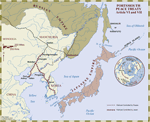
Article VI and VII map.
© MapWorks 2005.
View larger Map image.

Negotiating. Portsmouth Athenaeum collection. View larger image.

Cutter with envoys along the New Castle shore. Portsmouth Athenaeum collection. View larger image.

The transfer of the Eastern Chinese Railroad was one of the non-controversial articles. Harper's Weekly. View larger image.
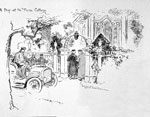
Niles Cottage in New Castle was Secretary Peirce's residence and the site of several dinners and receptions for both delegations. Harper's Weekly.View larger image.



